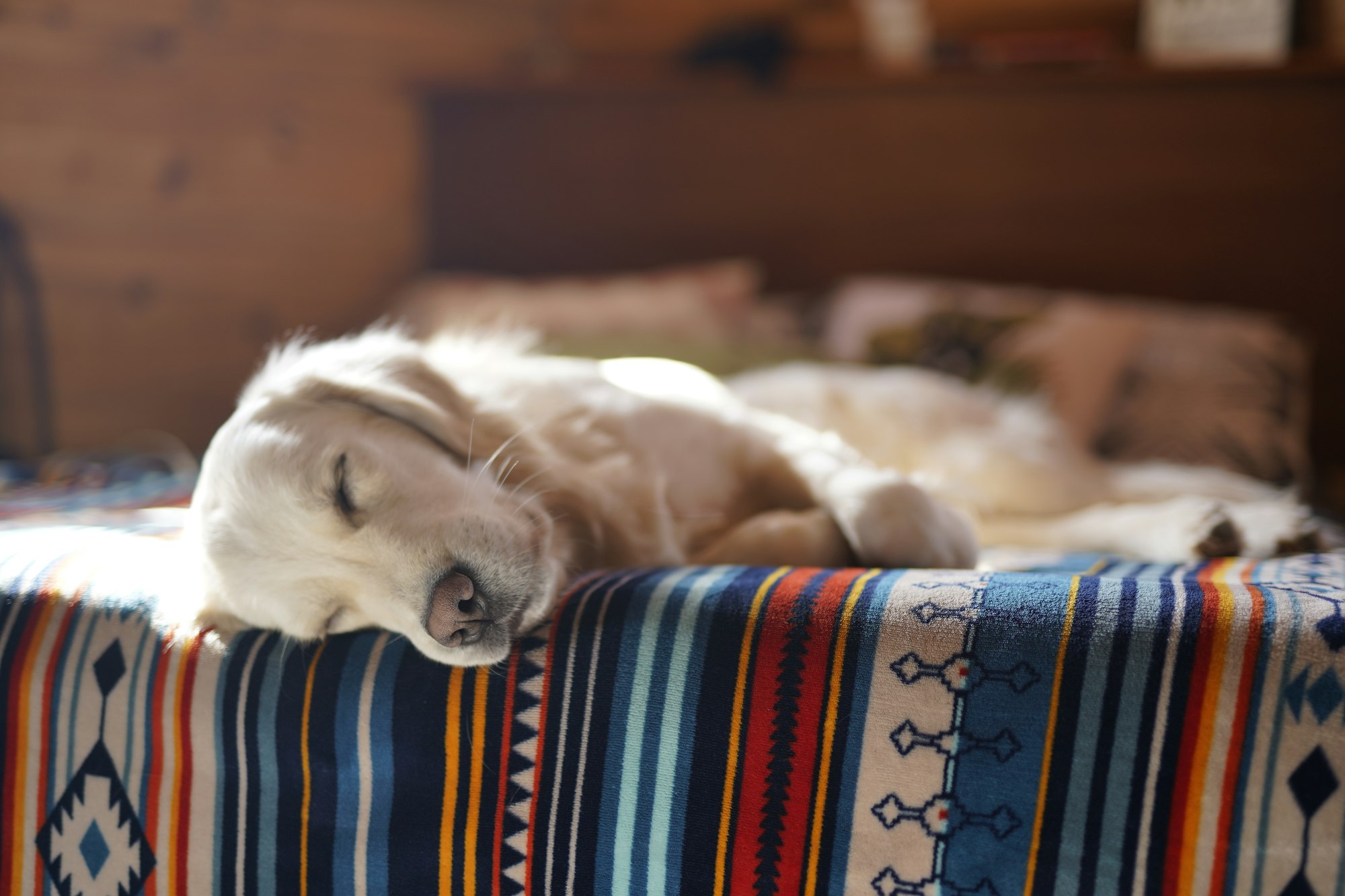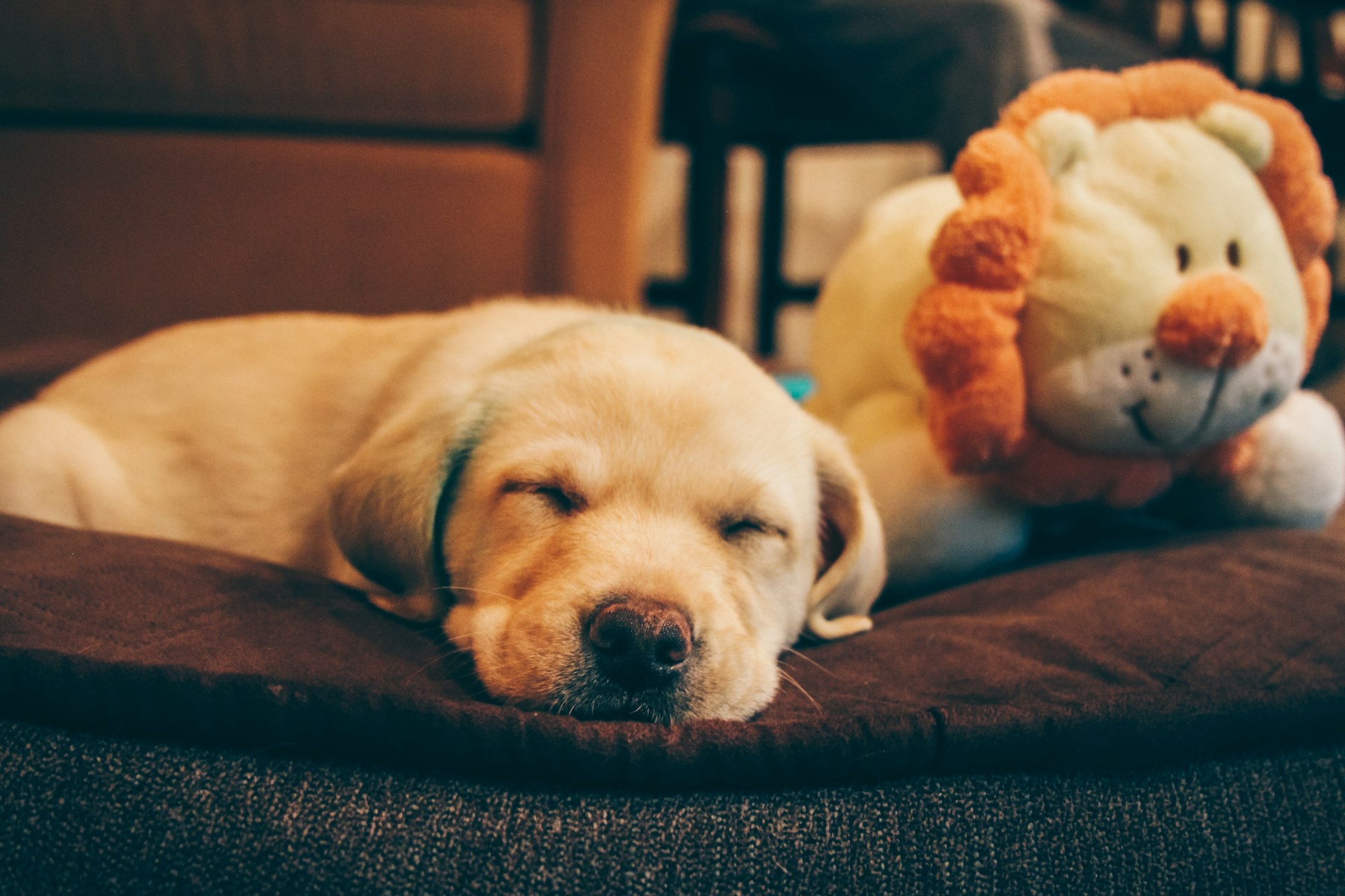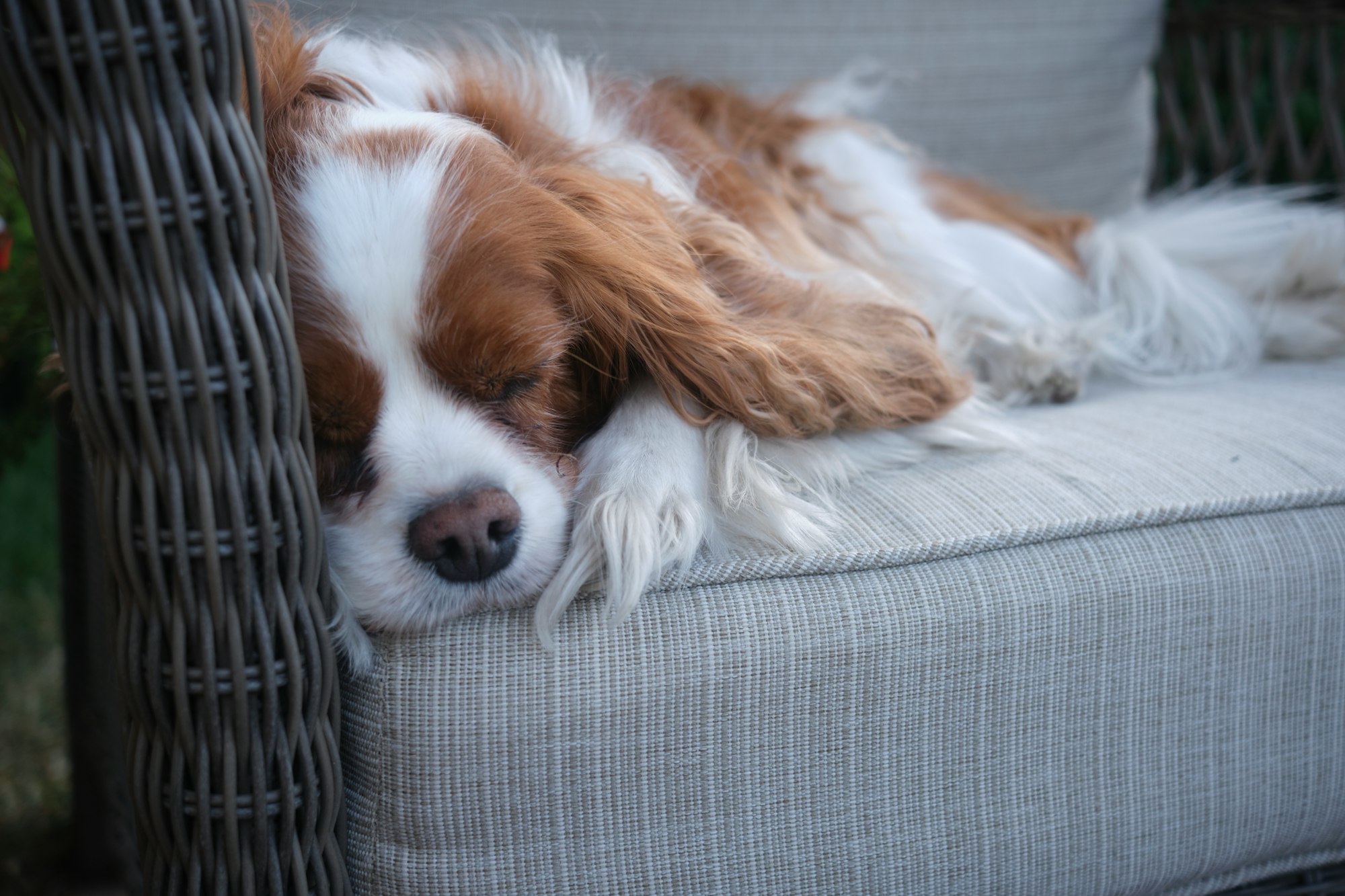Dogs, our loyal companions, often exhibit fascinating behaviors that leave us questioning the mysteries of their inner world. One such perplexing phenomenon is the act of howling in their sleep. As dog owners, witnessing our furry friends engage in this nocturnal symphony can be both endearing and puzzling. Let's delve into the science, psychology, and anecdotes behind why dogs howl in their sleep.

Definition of Howling in Dogs
Howling is a vocalization method employed by dogs, akin to barking, whining, or growling. Unlike daytime howling, which may serve various purposes, understanding why dogs howl during their slumber requires a deeper exploration.
Countless pet owners have shared stories of being startled awake by the sound of their dogs howling in the dead of night. These instances often raise questions about what might be happening in a dog's dreamland.
The Science Behind Dog Howling
Dogs are descendants of wolves, and howling is an instinct deeply rooted in their genetic makeup. Exploring the evolutionary reasons behind this behavior sheds light on its prevalence, even in domesticated dogs.
Communication Purposes
Howling serves as a form of communication among canines. Whether in response to distant sirens, other dogs, or unknown stimuli, dogs express themselves through a variety of howls, each carrying a unique message.
Dreaming and Sleep Patterns in Dogs
Understanding the connection between canine sleep patterns and howling requires a closer look at the REM (Rapid Eye Movement) phase. Like humans, dogs experience dreaming during this stage, raising intriguing questions about the content of their dreams.
Understanding Canine Dreams
Research suggests that dogs share similarities with humans in their dreaming experiences. This revelation prompts us to ponder whether dogs, like us, undergo a mental journey during sleep.
Exploring the significance of REM sleep in dogs unveils the potential connection between dream content and the occurrence of howling. This section examines the scientific aspects of canine sleep cycles.
Possible Triggers for Howling in Sleep
Examining external stimuli that might trigger howling in a dog's sleep provides insights into the environmental influences on their dreams. From sounds to scents, various factors contribute to these nocturnal vocalizations.
Emotional Responses
Dogs, known for their emotional intelligence, may express joy, fear, or anxiety in their dreams. Unraveling the emotional triggers behind sleep howling offers a window into their subconscious minds.
Health Considerations
Delving into potential health-related causes of howling during sleep ensures a comprehensive understanding. This section explores whether certain medical conditions may manifest in a dog's dreams.
Interpreting Dog Howls
Recognizing the diversity in canine howls enables us to interpret their meaning more accurately. Whether it's a mournful howl or a playful one, each type provides clues about a dog's state of mind.
Behavioral Clues
Observing a dog's behavior before, during, and after sleep howling contributes to our ability to interpret their vocalizations. This section explores the behavioral nuances associated with this nighttime phenomenon.
Addressing Concerns of Dog Owners
Dispelling concerns of dog owners who may wonder whether sleep howling is a cause for worry or simply a natural aspect of canine behavior. Understanding the normalcy of this phenomenon reassures pet parents.
When to Seek Veterinary Advice
Providing guidelines on when sleep howling may warrant a visit to the veterinarian ensures the well-being of our furry companions. Recognizing potential red flags contributes to responsible pet ownership.
Tips for Managing Howling
Exploring ways to enhance a dog's sleep environment proves beneficial in minimizing disruptive howling. From cozy beds to ambient sounds, creating an ideal sleeping space is key.
Consistent Sleep Schedule
Highlighting the importance of a consistent sleep schedule for dogs aids in regulating their sleep patterns. This section delves into the benefits of routine and its impact on canine sleep quality.
Positive Reinforcement
Introducing positive reinforcement techniques can be instrumental in curbing excessive howling. This segment provides actionable tips for reinforcing positive behaviors during sleep.
Common Myths About Dog Howling
Dispelling common myths surrounding dog howling, from superstitions to cultural beliefs, fosters a more accurate understanding of this behavior. Addressing misconceptions contributes to informed pet care.
Dispelling Misconceptions
Challenging prevalent misconceptions ensures that dog owners approach sleep howling with knowledge and a discerning mindset. This section separates fact from fiction, promoting a realistic perspective.
The Role of Breed and Genetics
Dogs come in various shapes, sizes, and, importantly, vocal tendencies. The howling symphony that echoes through the night is often influenced by a dog's breed and genetic makeup. Understanding the role of breed and genetics in the enigmatic world of canine howling adds another layer to our appreciation of these furry companions.

Breeds Prone to Howling
Certain dog breeds are renowned for their vocal prowess, and howling is often an intrinsic part of their nature. Siberian Huskies, Alaskan Malamutes, and Beagles, for example, have a strong instinct to vocalize, including the iconic howl. Exploring these breed-specific tendencies sheds light on the diverse ways in which dogs express themselves.
Genetic Influences on Sleep Behavior
Beyond breed predispositions, the influence of genetics on a dog's sleep behavior is a fascinating area of study. The intricate dance between nature and nurture plays out as dogs enter the realm of dreams. Understanding how genetic factors contribute to the likelihood of howling during sleep deepens our comprehension of the canine psyche.
As we delve into the genetic tapestry that shapes our dogs, it's crucial to recognize that each breed carries a unique set of characteristics. While some breeds are more prone to howling due to their ancestral ties to wolves, others may exhibit a more reserved demeanor. These breed-specific traits, passed down through generations, influence how dogs navigate the world of dreams.
Breeds Predisposed to Howling:
- Siberian Husky: Known for their wolf-like howls, Huskies often serenade the moon.
- Alaskan Malamute: With a strong pack mentality, Malamutes express themselves through harmonious howling.
- Beagle: Their keen sense of smell is matched by a distinctive howl, making them excellent hunters.
Understanding Breed-Specific Tendencies
Recognizing that different breeds have diverse ways of expressing themselves enhances our ability to interpret their behavior. While some happy dogs may howl more during sleep due to genetic predispositions, it's essential to appreciate this variation as part of the rich tapestry of canine diversity.
Moreover, as responsible pet owners, understanding our dog's breed-specific traits allows us to tailor our approach to their needs. Whether it's providing additional mental stimulation for breeds with a strong vocal inclination or offering a calm environment for those less predisposed to howling, acknowledging these differences contributes to a harmonious coexistence.
In conclusion, the role of breed and genetics in canine howling unveils the intricate web of influences that shape our dogs' behaviors, even in the realm of dreams. Embracing the diversity of breeds and their unique expressions adds depth to our connection with these wonderful companions. As we navigate the nocturnal symphony of howling, let's celebrate the individuality that each breed brings to the chorus of canine voices.
Do Dogs Dream of Electric Sheep?
Drawing parallels between real-life dog dreams and fictional portrayals, such as the famous question from Philip K. Dick's novel, provokes thought on the nature of canine dreams.
Venturing into speculative discussions about the content of dog dreams adds a touch of curiosity to our understanding of this mysterious aspect of canine behavior. What might dogs dream about, and how does it manifest in their howls?
Fun Facts About Canine Howling
Unearthing historical anecdotes and cultural significance attached to canine howling adds an element of fascination. This section explores how humans have perceived and interpreted dog howling over time.
Examining how different cultures view and interpret dog howling provides a broader context. From superstitions to symbolic meanings, this section explores the diverse cultural perspectives on this behavior.
Howling in Puppies vs. Adult Dogs
Considering the developmental aspects of howling in puppies versus adult dogs offers insights into the evolution of this behavior. This section explores how howling may change as dogs transition from puppyhood to adulthood.
Training Considerations
Discussing effective training strategies for managing howling in puppies lays the foundation for responsible pet ownership. This section provides practical tips for guiding a puppy's behavior during sleep.
Videos of Dogs Howling in Their Sleep
Sharing heartwarming and amusing videos of dogs howling in their sleep adds a visual dimension to our exploration. These viral moments not only entertain but also showcase the universal charm of canine companions.
Highlighting the entertainment value of dogs howling in their sleep contributes to the broader conversation about the joyful and endearing aspects of sharing our lives with these furry friends.
Testimonials from Dog Owners
1. Chloe's Midnight Serenade
"I used to wonder why Chloe, my Labrador, would howl in her sleep. After reading this article, I realized it's a normal part of her canine experience. Thanks for shedding light on this intriguing behavior!" - Sarah M., Dog Mom
2. A Symphony of Dreams
"Our rescue, Max, often howls in his sleep. Learning about the science behind it and understanding that it's a form of communication has made us appreciate his unique way of expressing himself." - Alex and James, Max's Adoptive Parents
3. Luna's Mysterious Melodies
"Luna, our Husky, is a nightly howler. This article helped us comprehend the different types of howls and the emotional responses behind them. Now, we feel more connected to her world." - The Smith Family
4. Comforting to Know It's Normal
"When our Sheltie, Teddy, started howling during sleep, we got concerned. The section on addressing concerns of dog owners reassured us that it's a normal behavior. Teddy is just sharing his dreams with us!" - The Andersons
5. From Puzzled to Informed
"I always wondered if my Corgi, Bailey, was dreaming of chasing sheep when he howled. The 'Do Dogs Dream of Electric Sheep?' section added a fun twist to our understanding. Great read!" - Emma R., Bailey's Human
6. Shared Joy of Howling
"Watching the videos of dogs howling in their sleep was such a delight. It captured the joy and innocence of our furry friends. Thanks for spreading the positivity!" - Mark H., Dog Enthusiast
7. Training Success with Positive Reinforcement
"Implementing the positive reinforcement tips for managing howling worked wonders for our Beagle, Daisy. The consistent sleep schedule made a noticeable difference. Kudos for practical advice!" - The Garcia Family
8. Breeds and Genetics Insight
"As a Dachshund owner, I appreciated the insight into breeds prone to howling. Understanding the genetic influences has given us a deeper perspective on our pup, Frankie." - The Rodriguezes
9. Dreams Unveiled
"Learning that dogs dream during REM sleep was fascinating. The article's exploration of the similarities with human dreams sparked intriguing conversations in our household. Well researched and informative!" - Emily T., Dog Lover

10. Heartwarming Shared Stories
"The shared stories section resonated with our experiences. It's heartwarming to know that other dog owners cherish the uniqueness of their pets' howling. Dogs truly bring joy to our lives!" - The Martins
These testimonials reflect the diverse experiences of dog owners who have gained valuable insights into the phenomenon of dogs howling in their sleep. Each story adds a personal touch to the broader understanding of canine behavior.
Conclusion
In conclusion, the phenomenon of dogs howling in their sleep is a multifaceted aspect of canine behavior that combines instinct, genetics, and the mysteries of dreams. Understanding the science behind howling, addressing concerns of pet owners, and appreciating the quirks of individual dogs contribute to a holistic perspective on this intriguing topic. As we navigate the realms of canine dreams, let us celebrate the uniqueness of each howl as a glimpse into the rich inner world of our beloved companions.
Frequently Asked Questions (FAQs)
- Is it normal for dogs to howl in their sleep?
- Yes, it is normal for dogs to howl in their sleep. Howling is a natural behavior rooted in their instincts and may occur during dreaming.
- Should I be concerned if my dog howls excessively in sleep?
- Excessive howling in sleep may warrant attention. If accompanied by changes in behavior or health, consulting a veterinarian is advisable.
- Can I train my dog to stop howling in sleep?
- Training techniques, such as positive reinforcement and a consistent sleep schedule, can help manage howling. However, it's essential to be patient and consistent.
- Are certain breeds more prone to howling during sleep?
- Yes, some breeds are more predisposed to howling due to their genetic makeup. Understanding breed-specific tendencies can offer insights into this behavior.
- Do puppies and adult dogs howl differently in their sleep?
- Howling may evolve as dogs grow, with puppies exhibiting different sleep behaviors. Training considerations may vary based on the age and developmental stage of the dog.